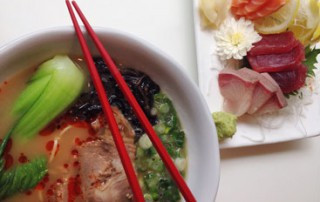“You Can’t Do That in China!” Essential Chinese Etiquette Guide for Students & Tourists in China
Dos and Don’ts in China and Chinese Manners
“You can’t do that in China!”. Chinese etiquette guide for foreigners in the Middle Kingdom about Chinese manners and the dos and don’ts in China. In reality you’re not going to get deported or run out of town by an angry mob for making a minor cultural faux pas. As a foreigner in China you’ll already be regarded as an alien, so strange behavior from you is positively expected.
A little effort is always appreciated however, and showing courtesy can get you a long way, so it might be useful to read this guide before arriving in China. In this article we’ll look at a few often shouted about ‘dos and don’ts in China’ and Chinese manners that will help you make better connections and blend in as much as possible (which is probably not very much; but no harm in trying!).
 Do Not leave your chopsticks sticking straight up in your rice bowl when eating. It reminds people of the incense sticks used at funerals, and could even be interpreted as a curse against your host, so may bring the mood down a bit.
Do Not leave your chopsticks sticking straight up in your rice bowl when eating. It reminds people of the incense sticks used at funerals, and could even be interpreted as a curse against your host, so may bring the mood down a bit.
Do Not play with your chopsticks, like banging them on the bowl. You weren’t planning to do this anyway, of course, unless you’re 8 years old, but other Chinese etiquette guides on Chinese manners do seem to stress this point quite strongly. Is there an epidemic of spontaneous chopstick-drum jam sessions in Mainland Chinese restaurants?
Do Not tip. China is not a tipping culture, so only high end hotels and restaurants that cater primarily for foreigners expect this custom. Tipping at a small, local fast food restaurant will normally lead to an anxious looking waiter chasing you down the street trying to return your ‘forgotten’ money to you.
When going out or sharing a meal with Chinese hosts they’ll often try to get you drunk or test your endurance. Provided you’re in a safe setting, there’s no harm in having fun; just be sure you know your limits. The Chinese spirit Baijiu (literally ‘white alcohol) needs to be tried once. Which leads us to…
Do Not drink Baijiu (ever again). Ok, so you’ve passed the test and had your first experience with Baijiu. Now you know not to do that again… ever. It tastes like vodka which has fallen into a sewer. It’s more like industrial strength floor cleaner than a drink for human beings. It is often served in a large plastic gallon drum, like you’d see at petrol stations, which gives you some idea about the flavor. Best stick with the local 2.5% beer.
Do Not give clocks or watches as a gift. Like the chopsticks in the bowl situation, it brings to mind death and funerals. Probably not a good call. When receiving gifts, don’t open them straight away, – it’s more polite to wait until you’re home. Avoid black or white wrapping paper, red is best. Give and receive gifts (and business cards) with two hands, not one. Do not gift explosives or dangerous wild animals, and… well I’m getting carried away, but you get the point.
Do push in as much as possible. Treat queues not as orderly, civil lines of people waiting patiently for their turn, but as an ‘every man for himself’ life or death race to the front. Use your elbows, your knees, your fists. Push everyone out of your way. Show no mercy – small children, old ladies and the infirm tumble easily so should be your first targets.
(In all seriousness Chinese queues seem to be getting better, and can even be vaguely orderly at times. However pushing in is still very common, so keep your wits about you and guard your place diligently.)
Do Not get offended when people crash into you in crowded places. You said goodbye to personal space the moment you got off the plane. That old man who pushes you roughly with both arms in the subway station is just doing it to show affection.
Do Not associate with locals at all, under any circumstances. Surround yourself only with fellow foreigners – particularly those from your home country. People from other countries have strange ideas and are very easily offended. If you do anything wrong they will deport you with one arm whilst stealing your wallet (and maybe your kidneys) with the other. Plus your Chinese will improve much faster if you never have to experience the awkward, scary challenge of actually speaking it with real-live locals.
There’s plenty more out there if you want to get serious, but that’s enough to get started. If you plan to be doing some business in China, here’s an in depth guide to business and Chinese etiquette. The best thing you can do in any circumstances, however, is to be observant. Watch what locals and more experienced guests do, and learn from them.
Customs and expectations vary depending on the situation you’re in, so be flexible and have an open mind. It is important to be respectful, but don’t get so obsessed with protocol that you forget to enjoy the delicious food, warm hospitality and horrendous Baijiu hangovers which is what being a foreigner in China is all about.
